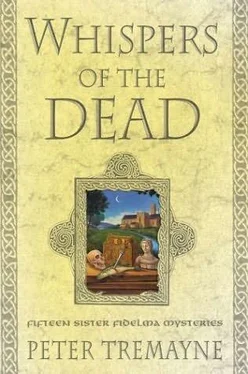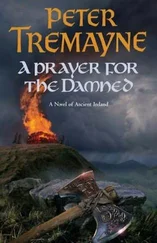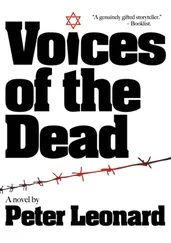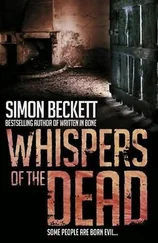Peter Tremayne - Whispers of the Dead
Здесь есть возможность читать онлайн «Peter Tremayne - Whispers of the Dead» весь текст электронной книги совершенно бесплатно (целиком полную версию без сокращений). В некоторых случаях можно слушать аудио, скачать через торрент в формате fb2 и присутствует краткое содержание. Жанр: Исторический детектив, на английском языке. Описание произведения, (предисловие) а так же отзывы посетителей доступны на портале библиотеки ЛибКат.
- Название:Whispers of the Dead
- Автор:
- Жанр:
- Год:неизвестен
- ISBN:нет данных
- Рейтинг книги:4 / 5. Голосов: 1
-
Избранное:Добавить в избранное
- Отзывы:
-
Ваша оценка:
- 80
- 1
- 2
- 3
- 4
- 5
Whispers of the Dead: краткое содержание, описание и аннотация
Предлагаем к чтению аннотацию, описание, краткое содержание или предисловие (зависит от того, что написал сам автор книги «Whispers of the Dead»). Если вы не нашли необходимую информацию о книге — напишите в комментариях, мы постараемся отыскать её.
Whispers of the Dead — читать онлайн бесплатно полную книгу (весь текст) целиком
Ниже представлен текст книги, разбитый по страницам. Система сохранения места последней прочитанной страницы, позволяет с удобством читать онлайн бесплатно книгу «Whispers of the Dead», без необходимости каждый раз заново искать на чём Вы остановились. Поставьте закладку, и сможете в любой момент перейти на страницу, на которой закончили чтение.
Интервал:
Закладка:
Fidelma was thoughtful. “Thank you, Brother Manchán.”
She went forward to where Brother Gebhus was standing nervously awaiting her.
“Now, Brother Gebhus.” She drew him to one side of the kitchen, away from where Brother Dian was now intent on ensuring the fruit dishes were being handed to the servers.
“I don’t know anything, Sister,” the young man began nervously.
Fidelma suppressed an impatient sigh. She pointed to a hearth where a fire crackled under a hanging cauldron.
“Would you like to put your hand in that fire, Brother Gebhus?” she asked.
Brother Gebhus looked startled. “Not I!”
“Why?”
“I don’t want my hand burnt.”
“Then you do know something, Gebhus, don’t you?” she replied acidly. “You know that the fire will burn your hand.”
Brother Gebhus stared blankly at her.
“Think about the meaning of what you are saying before you answer my questions,” explained Fidelma. “I need them to be answered with accuracy. How long have you worked here?”
“Two years in this kitchen.”
“You assist Brother Dian?”
He nodded briefly, eyes warily on her.
“How well did you know Brother Roilt?”
“Not well. I. . I tried to avoid him. I did not like him because. .” He hesitated.
“He made advances to you?”
The young man sighed deeply. “When I first came to the abbey. I told him that I was not like that.”
“You were standing here when Dian went to look for Roilt?”
“He went to look for the fish,” corrected Gebhus. “The chief server had come in and said that the gratias was about to be said and Brother Dian turned and looked down the aisle there to where Brother Roilt was cooking the fish for the guest of honor. He could not see him and so he went to find him.”
“And you remained here?”
“I was here from the moment I came into the kitchen this evening.”
“Was Brother Dian with you the whole time?”
“Not the whole time. He had to discuss the meal with Brother Roilt before we began and once or twice he went to consult with him and the other cooks.”
The refectory door opened at that point and Abbot Laisran came in, looking worried. He approached Fidelma.
“I just had to come to see if you had any news. Have you decided who stole the fish?”
Fidelma smiled her curious urchin-like grin.
“I knew who stole the fish some time ago. But you are just in time, Father Abbot.”
She turned and called for everyone to gather around her. They did so, expectantly, almost fearfully.
“Do you know who murdered Brother Roilt?” demanded Brother Dian, asking the question that was in everyone’s minds.
Fidelma glanced swiftly at them, observing their growing anticipation.
“Brother Manchán, would you mind removing your apron?” she asked.
The young brother suddenly turned white and began to back away.
Brother Torolb grabbed him and tore the apron off. Beneath the pristine white apron, Brother Manchán’s habit was splattered with bloodstains.
Abbot Laisran was bewildered. “Why would Brother Manchán kill Roilt?”
“Reasons as old as the human condition: jealousy, love turned to hatred; an immature and uncontrollable rage at being rejected by a lover. Manchán had been Roilt’s lover until Roilt turned his attentions to a new young novitiate. Roilt rejected Manchán for a younger man. Presumably Roilt was neither sensitive nor tactful in bringing an end to his relationship and so Manchán killed him.”
The young man did not deny her accusation.
“How did you know?” asked the Abbot.
“Brother Manchán was very eager to point an accusing finger at others in the kitchen and out of it, especially at Brother Dian. I realized that he was just too eager.”
“But you must have had something else to go by?” Brother Dian asked. “Something made you suspect him.”
“Brother Manchán was, of course, best placed to kill Roilt. When everyone had their attentions fixed on their tasks he seized the opportunity. He went forward, struck so quickly that Roilt did not have time to cry out, and then he dragged Roilt to the storeroom. He even went into the garden and opened the wooden gate, which was usually kept shut and bolted, in an attempt to lay a false trail. He pointed out to me that the gate had been open. Yet Dian, finding it so, had shut it and bolted it again almost immediately. How had he known that it had been open?”
“And he also took the fish to lay a false trail?” suggested Brother Dian.
Fidelma shook her head with a smile. “He did not have time to do that. No; the fish was actually stolen by someone else. The opportunity to take the fish was seized when Roilt was no longer there to prevent it.”
“Just a minute,” interrupted Abbot Laisran. “I still do not understand how you initially came to suspect Manchán. Suspicion because he tried to lay the blame on others is not sufficient, surely?”
“You are right, as always, Father Abbot,” conceded Fidelma. “What alerted me was the problem of his apron.”
“His apron?” frowned the Abbot.
“Manchán would have us believe that he was working away making bread. Indeed, there was a fine dust of flour over his clothing with the exception of his apron which was clean; pristine white. It was clearly not the apron that he had been wearing while he was working. Why had he changed it? When Roilt was killed blood had splattered on the floor. It would have splashed on his clothes, especially on a white apron. He changed the apron in the storeroom, covering the bloodstains that had seeped through onto his habit. Seeing that clean white apron made me suspicious and his eagerness to point the finger at others simply confirmed my instinct. The reference to the gate merely confirmed matters. Now you have the proof,” she added with a gesture at Manchán’s bloodstained robes.
Abbot Laisran stood nodding his head thoughtfully as he considered the matter. Then he suddenly looked at her in bewilderment. “But the fish? Who stole the fish?”
Sister Fidelma moved across to the kitchen door and pointed down to the empty tin dish by the door.
“I noticed this earlier. It looks as though it is used to contain milk. Therefore, would I be correct in presuming that there is a cat who frequents the kitchen area?”
Brother Dian gave a gasp which was enough acknowledgment of this surmise.
Fidelma grinned. “I suggest that a search of the garden will probably disclose the remains of the fish and your cat curled up nearby having had one of the best meals of its life. It was the cat who stole the fish.”
CRY “WOLF!”
Is that all the petitions and statements?” asked Sister Fidelma with a sigh of relief.
It had been a long morning and Sister Fidelma had been fulfilling the job that she liked least as a dálaigh or an advocate of the courts of the five kingdoms of Éireann. Having qualified to the level of anruth, only one level below the highest degree accorded by the ecclesiastical and secular colleges of Ireland, she would often be asked by the Chief Brehon, the senior judge, of the kingdom of Muman, which her brother, Colgú, ruled from Cashel, to hear minor cases. This usually meant visiting outlying corners of the kingdom where there was no permanent Brehon. She would judge minor cases, or study submissions from plaintiffs to see whether there was some case of civil or criminal law that had to be heard by a more senior Brehon.
She had spent the night in her least favorite part of her brother’s kingdom. It was a disputed territory claimed by the princes of the Uí Fidgente and those of the Eóghanacht Áine. The Eóghanacht Áine were related to her own family and there had been many conflicts between them and the Uí Fidgente. Yet, these conflicts apart, she admitted that the area was a beautiful country. It was a large, fertile valley; a lush green plain which was sheltered by surrounding hills and stretched north to a great sea inlet.
Читать дальшеИнтервал:
Закладка:
Похожие книги на «Whispers of the Dead»
Представляем Вашему вниманию похожие книги на «Whispers of the Dead» списком для выбора. Мы отобрали схожую по названию и смыслу литературу в надежде предоставить читателям больше вариантов отыскать новые, интересные, ещё непрочитанные произведения.
Обсуждение, отзывы о книге «Whispers of the Dead» и просто собственные мнения читателей. Оставьте ваши комментарии, напишите, что Вы думаете о произведении, его смысле или главных героях. Укажите что конкретно понравилось, а что нет, и почему Вы так считаете.












